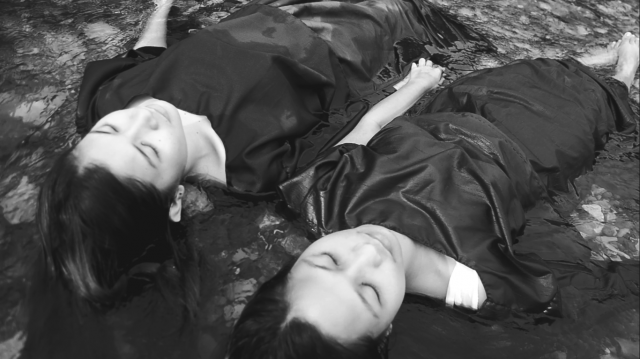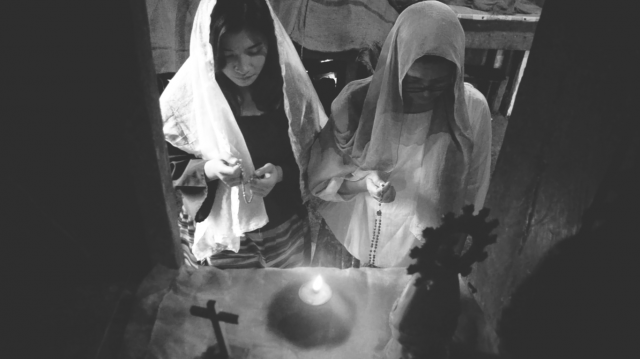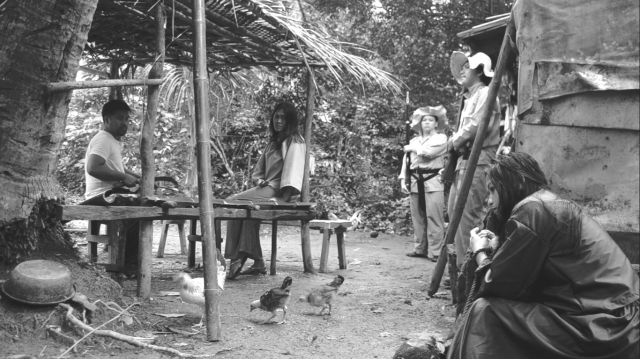'Kulay Abo ang Ilog ng Gunita' is among the finalists for the Indie category of Brighton Rocks Film Festival 2018
Resbak Filmz’s latest offering “Kulay Abo ang Ilog ng Gunita” (Ashen River of Remembrance) may have been filmed on an ultra-low budget, but it's making waves in various film festivals around the globe.
The 15-minute black-and-white independent film is among the finalists for the Indie - Low Budget category of Brighton Rocks Film Festival 2018, UK's main festival for indie and underground cinema. Winners will be announced on May 1.
Brighton Rocks is the fifth festival the short film has been nominated in this year. After participating at the North Luzon Film Festival in Cagayan, it set sail to India for the Bangalore Queer Film Festival, to Italy for the Cefalu Film Festival (Cefalù Film Festival Pino Scicolone), and recently to Austria for the LET’S CEE Film Festival.
“Kulay Abo” was the first Filipino film to enter the 6th LET’S CEE Film Festival, held in Vienna, Austria, last April 13 to 22.
But director Ronaldo S. Vivo, Jr. shares that due to tight budget and the constraints of his day job, he hasn't been able to attend any of the festivals.

“Pinalad lang akong makadalo sa isang festival sa Austria noong nakaraang taon, sa tulong ng Goethe-Institut Philippines,” the screenwriter-director said. He was referring to the YOUKI International Youth Media Festival where “Bendor” (Vendor), a short film he also created with his brother Ronnel S. Vivo, was showcased.
Low Budget, High-Caliber
Reminiscent of Lav Diaz’s “Hele sa Hiwagang Hapis” (A Lullaby to the Sorrowful Mystery), which Vivo confessed he has not had the chance to see, “Kulay Abo” follows the story of Pinang (Julie Rebucas), a young lady who lives in a small village in the province of Cagayan.
The story took place during the early stages of Spanish colonization of the Philippines.
A lot of factors had been taken into consideration before the making of the film. Vivo wrote the script, including some lines in the Ilocano language.
“May isang maliit na baryo sa Cagayan na mayaman ang kasaysayan sa panahon ng pananakop ng mga Kastila. Ito ang napili kong maging lugar ng kwentong nabuo ko. Maigi at isa sa mga kasama ko’y Ilokano at may inang maalam sa nasabing wika. Ikinonsulta ko ang script at nagpatulong na ring mag-translate,” he said.
Vivo, an employee in the city government of Makati, related that the film was shot during an office outing with officemates.
It happened around November, “sa pagkakatanda ko,” he said, “bago ako umattend ng festival sa Wels, Austria nung nakaraang taon. Isang araw lang shoot, sa Daraitan. Nagsimula ng umaga at kailangang magtapos bago magdilim.”
Only an old DSLR camera was used to shoot the entire film.
“Walang reserbang baterya, at dahil liblib ang lugar, kapag na-lo-low batt ang baterya, kailangan pa naming maki-charge sa nag-iisang bahay na may kuryente sa lugar. Kaya naman hangga’t maaari, hangga’t kaya, one take lang.”
According to Vivo, none of the cast members work as professional actors. They are all regular employees. This ‘limitation’ was among the things that he had to consider in writing the script.

“Kung ang mga gaganap sa pelikula ko’y mga taong unang beses sasabak sa pag-arte at pagpepelikula, kailangan kong gumawa ng paraan kung saan hindi magiging hadlang ang kawalang karanasan ng mga magsisipagganap. Kaya binuo ko ang mga karakter batay sa pagkakakilala ko sa kanila – kung pa’no sila kumilos, magsalita, gumalaw. Sa ganoong paraan, halos hindi nila kailangang umarte.”
Salvation or Eternal Damnation?
“Kulay Abo” opens with a quote from Jay Jomar F. Quintos’s critical essay “A Glimpse Into the Asog Experience: A Historical Study on the Homosexual Experience in the Philippines,” which explains that during the Spanish colonization period, the colonizers “saw themselves as purifiers and harbingers of culture to natives beholden to elemental spirits and demons.”
It tackles how lesbians (refered to as bayoguin in the film, as well as in Quintos’ essay) were seen in the eyes of the friars and their Catholic followers.
For the local townsfolk, Pinang’s special relationship with Soleng (Liesian Tamunday) came about because she was possessed by an evil spirit.
Pinang’s parents believed that she will be “cured” through an incessant ritual of confessions officiated by Padre Vacion (Dreb Rodriguez). Added to that, a townsfolk told her that she was “the a fruit of unspeakable acts done to my mother by a Spanish priest.”
Vivo confirmed that the Spanish friar was wearing a brown habit, suggesting a relation to the atrocities of Padre Damaso of the Franciscan order, a character in Jose Rizal’s novel Noli me tangere.
Although he also said that Padre Vacion is a composite character of a bigger religious and political entity.
“Salvacion. Salvation. Representasyon si Padre Vacion ng isang malaking entity na nagtatangan ng listahan ng mga bawal at nagpapaalala sa mga kabilang sa naniniwala sa listahan na huwag mong gawin ito, huwag mong gawin iyan, ito lang ang mga p’wede, habang nae-enjoy n’ya ang pagbali sa mismong listahan ng mga dapat at di-dapat.
False salvation needs blind followers in order to thrive, “tulad ng isang masang lango sa pangako ng pagsasalba, walang reklamong aakapin ang salbaheng tagasalba.”

Vivo further explained that the friar represents institutions that loom over the Filipino people, regardless of the time period. “Ito ang iskema noon pa man, lalo ngayon. Ngayon, hanggang 2022 ata,” he said.
In the same way, the tragedy of Pinang represents the history of the country in the hands of foreign invaders during the last four centuries, as well as in the present times.
The film will take viewers on shocking twists and ending that involve righteous anger, revenge, murder, and whatever symbolizes the wild boar.
LGBT Portrayal
The men behind Resbak Filmz, albeit heterosexuals, acknowledge the vibrance and value of queer cinema in the country. Aside from the concerns of the LGBT (lesbian, gay, bisexual, and transgender) community, they also focus on a variety of contemporary issues.
“Doon, nakakita ako ng pagkakataong eksaminin sa ibang anggulo ang paksa – historical. Wala akong sinusundang tradisyon dahil wala rin naman akong pormal na aral sa paggawa ng pelikula. Kalahating instinct, kalahating siyensa,” Vivo explained.
Vivo also looked into the LGBT films that were produced in the country, if they have the same theme and treatment as “Kulay Abo.”
“Maraming pelikulang LGBT ang bansa bago pa man magkaroon ng wave ng LGBT films noong 2004 – onwards. ‘Yung tema ng pelikula, tulad nga ng nasabi ko, para sa akin ay pagkakataong silipin at eksaminin ang paksa sa ibang anggulo,” he stated.
To his knowledge, their film was the first to employ a historical approach.
“Walang ibang gustong ma-achieve ang pelikulang ito, para sa akin, kundi ang paghahayag ng batbat na dahas lulan ng bulag na pananampalataya. Inuulit ko, batbat na dahas lulan ng bulag na pananampalataya. At hindi lang ito sa usaping moralidad at kung anong mga katanggap-tanggap lang sa listahan ng mga bawal ng isang organisasyon.”
On a different note, followers of Resbak Filmz will wait no further. Their next independent film project “Meta-Hegemoniya, Meta-Industriya” is set to be shown in local and international film festivals. — LA, GMA News





